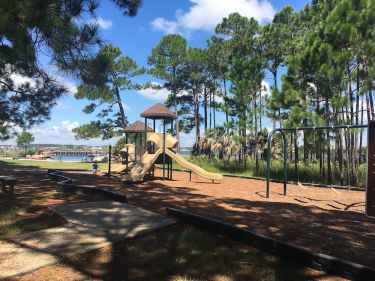
St. Andrews State Park

Welcome to St. Andrews State Park!
With the Gulf on one side and St. Andrews Bay on the other, those that crave swimming, snorkeling or surfing will be more than satisfied.
Besides boasting a mile-and-a-half of pristine beaches for fishing and swimming, St. Andrews also offers the chance for visitors to stroll through pines, dunes and coastal plant communities, or set up camp in the campground or primitive group area.
Shell Island:
Originally Lands End Peninsula, Shell Island was created when the Gulf-Bay Pass was dredged in the 1930’s. A visit to the island with its stretches of bright, sandy beaches backed by sea-oat capped dune system is a trip to the Florida of many centuries ago: primitive, unspoiled, peaceful. Good fishing can be enjoyed on both sides of the island and you may find a myriad of shells along the beaches. Seabirds nest in the dunes and sea turtles deposit their eggs above the high-water line in early to mid-summer. Visitors are asked not to disturb this habitat.
World War II:
In 1942 the War Department selected the site overlooking the new pass for a temporary Harbor Defense installation and directed the emplacement of two 155 mm guns to be built among the dunes just west of the jetties. To this day one of the original gun mounts is now shaded by a pavilion to protect it from the elements.
Teddy the Hermit:
The first known full-time resident of the land now occupied by the Park was a Norwegian-born sailor named Theodore Tollofsen, known affectionately as “Teddy the Hermit”. Left homeless when his 26 foot boat was wrecked and cast ashore on the south bank of Grand Lagoon by a hurricane in 1929, Teddy decided to homestead where the remains of his boat had been left, and he remained there for 25 years until his death in 1954 at age 74.
Cracker Turpentine Still:
Visitors can learn about the turpentine era at the parks old Cracker Turpentine Still. The Cracker Turpentine Still was donated in 1963 from the Lewis Family and relocated from Bristol, Florida. The still is a replica of an operational turpentine still from the turpentine era when turpentine and rosin were indispensable to Naval stores.















